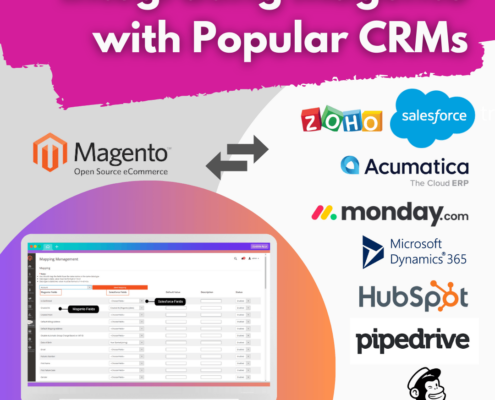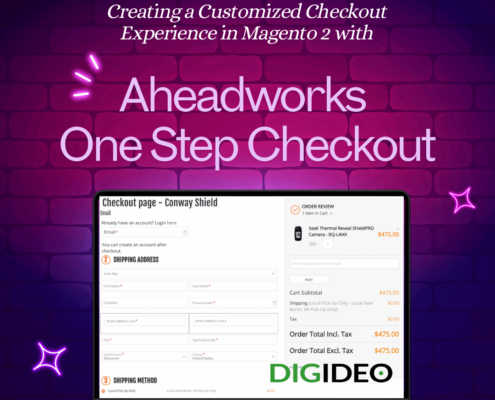 Digideo
https://www.digideo.co/wp-content/uploads/2025/06/Magento-C2C-Marketplace-Platform-1020px.png
1080
1080
Urszula Urban
https://www.digideo.co/wp-content/uploads/2023/06/digideo2019-340-1.jpg
Urszula Urban2025-06-16 13:17:312025-07-01 14:11:40Is Magento the Best Solution to Create a Marketplace Platform (Multiple Sellers, One Store)?
Digideo
https://www.digideo.co/wp-content/uploads/2025/06/Magento-C2C-Marketplace-Platform-1020px.png
1080
1080
Urszula Urban
https://www.digideo.co/wp-content/uploads/2023/06/digideo2019-340-1.jpg
Urszula Urban2025-06-16 13:17:312025-07-01 14:11:40Is Magento the Best Solution to Create a Marketplace Platform (Multiple Sellers, One Store)?For small business manufacturers, like some of our clients, enhancing eCommerce strategies through AI tools can significantly boost productivity, marketing efficiency, and sales.
Below are some of the latest AI tools that we used for some of our clients, which can improve various aspects of eCommerce operations, including customer engagement, inventory management, personalization, and digital marketing:
1. Chatbots and Conversational AI (Customer Support and Engagement)
Tools: Tidio, Drift, Chatfuel, Zendesk AI, Zoho Sales IQ
– How they benefit: AI-powered chatbots can handle customer inquiries, recommend products, and provide support 24/7. These tools allow small businesses to offer quick responses without needing a full-time team, increasing customer satisfaction and conversions. For example, Conway Shield, which specializes in specific gear, these tools could help customers navigate to the right products, answer questions about specifications, or handle order statuses.
2. AI-Powered Product Recommendations (Personalization)
Tools: Dynamic Yield, Nosto, Optimizely
– How they benefit: Personalizing the shopping experience based on customer behavior is a powerful way to increase average order value. AI tools can analyze customer data and suggest relevant products, enhancing the shopping experience. For instance, if Conway Shield sells custom or specific products, an AI recommendation engine can suggest complementary items or bundles based on previous user preferences. We use Amasty plugins for such purposes.
3. AI-Driven Inventory Management in eCommerce Strategies
Tools: Zebra Technologies, Ecomdash, NetSuite (Oracle)
– How they benefit: Inventory management is critical for small businesses. AI-driven tools help predict product demand, manage stock, and optimize supply chains. For a medium-sized company that may need to manage a range of specialized products, AI can help in forecasting demand for specific safety gear, ensuring that popular items are always in stock and reducing overstocking of slower-moving products.

4. AI for Customer Insights and Predictive Analytics
Tools: Google Analytics 4 (with AI), Kissmetrics, Glew.io
– How they benefit: AI tools that analyze customer data can provide insights into shopping behaviors, helping to predict trends and target marketing efforts more effectively. This is especially useful for e-commerce growth strategies dedicated to niche markets. Predictive analytics can help identify which customers are most likely to make a purchase or which products will perform well in the coming months, allowing for smarter marketing decisions and promotions.
5. AI-Powered Content Creation (Marketing Automation)
Tools: Jasper, Copy.ai, Writesonic, and many others. It will be interesting to see which tools survive next year.
– How they benefit: These AI tools can automate content creation, including product descriptions, blog posts, and ad copy. They can also optimize content for SEO, making it easier for potential customers to discover your brand online. For small businesses, AI-generated content can save time and resources while ensuring consistent and effective communication with your target audience.
6. AI for Ad Targeting and Campaign Optimization
Tools: AdRoll, Hunch, Madgicx
– How they benefit: These tools use machine learning to optimize ad spend by analyzing customer behavior and targeting the right audiences. For small businesses, this ensures that marketing budgets are being used effectively. By automating the ad optimization process, these AI tools can help reach potential customers more efficiently, whether through Facebook, Google, or other ad platforms, improving overall campaign ROI.
7. AI-Powered Email Marketing
Tools: Klaviyo, Mailchimp (with AI), Omnisend
– How they benefit: AI can help personalize email marketing campaigns, determine the best send times, and craft messages based on customer behavior. Klaviyo, for instance, can segment audiences based on purchase history, making it easier to send targeted campaigns that are more likely to convert. For Conway Shield, AI-enhanced email marketing drives repeat purchases, upsells new products, and re-engages inactive customers.
8. AI Visual Search (Improved User Experience)
Tools: Syte, Slyce, Google Lens
– How they benefit: Visual search allows customers to upload images and find similar products in your inventory. This can be especially useful if customers want to find specific items based on visuals or similar items they’ve seen elsewhere. AI-driven visual search enhances the user experience and encourages product discovery.
9. AI for Pricing Optimization
Tools: Prisync, Wiser, Pricefx
– How they benefit: These tools use AI to adjust prices based on competitor pricing, customer behavior, and market conditions. For small businesses, AI pricing strategies can help stay competitive while maximizing profits. Pricing tools can automatically recommend price changes, sales, or discounts based on market trends. We build a few similar tools without AI by using dedicated algorithms and data flow from various marketplaces and warehouses. AI can speed up the process of analysis and pricing recommendation.
10. AI for Fraud Detection
Tools: Signifyd, Riskified, Sift
How they benefit: Fraud prevention is critical for eCommerce businesses. AI tools in this area can analyze transactions in real-time and detect fraudulent activities with greater accuracy than traditional methods. One shop can protect the business by using AI to reduce chargebacks and fraud-related losses.
These AI Tools Can Benefit Your Future Campaigns
– Increased Efficiency: Automating repetitive tasks (like responding to common customer queries or managing inventory) frees up your time to focus on other aspects of your business.
– Enhanced Personalization: AI helps deliver more personalized experiences, whether through product recommendations, emails, or ads, leading to higher conversion rates.
– Better Targeting: AI allows for more precise targeting, ensuring that your marketing budget is spent wisely and reaches the right audience.
– Improved Customer Experience: Tools like chatbots and visual search provide better customer service and make the shopping process smoother.
– Data-Driven Decisions: Predictive analytics and customer insights help guide strategic decisions, from product offerings to marketing channels.
Incorporating these AI tools into your eCommerce strategies will streamline your operations and help tailor your campaigns to meet the specific needs of your customers, driving growth and increasing revenue for any size of business.
Leave a Reply Cancel reply
You must be logged in to post a comment.
Our posts
 Digideo
https://www.digideo.co/wp-content/uploads/2025/06/Magento-C2C-Marketplace-Platform-1020px.png
1080
1080
Urszula Urban
https://www.digideo.co/wp-content/uploads/2023/06/digideo2019-340-1.jpg
Urszula Urban2025-06-16 13:17:312025-07-01 14:11:40Is Magento the Best Solution to Create a Marketplace Platform (Multiple Sellers, One Store)?
Digideo
https://www.digideo.co/wp-content/uploads/2025/06/Magento-C2C-Marketplace-Platform-1020px.png
1080
1080
Urszula Urban
https://www.digideo.co/wp-content/uploads/2023/06/digideo2019-340-1.jpg
Urszula Urban2025-06-16 13:17:312025-07-01 14:11:40Is Magento the Best Solution to Create a Marketplace Platform (Multiple Sellers, One Store)? https://www.digideo.co/wp-content/uploads/2025/01/Top-trends-2025-Pinterest-Predicts-can-grow-your-business-2025-01-15-15-21-40.png
842
1663
Urszula Urban
https://www.digideo.co/wp-content/uploads/2023/06/digideo2019-340-1.jpg
Urszula Urban2025-02-28 17:55:512025-04-07 11:36:40Top Trends in ecommerce 2025
https://www.digideo.co/wp-content/uploads/2025/01/Top-trends-2025-Pinterest-Predicts-can-grow-your-business-2025-01-15-15-21-40.png
842
1663
Urszula Urban
https://www.digideo.co/wp-content/uploads/2023/06/digideo2019-340-1.jpg
Urszula Urban2025-02-28 17:55:512025-04-07 11:36:40Top Trends in ecommerce 2025 Digideo
DigideoWhat are the latest AI tools that can enhance ecommerce strategies
AI, business tools, e-commerce, strategy
The Future of E-commerce Platforms: What to Expect in the Next 5 Years
consulting, e-commerce, strategy Digideo
https://www.digideo.co/wp-content/uploads/2024/12/Integrating-Magento-with-Popular-CRMs.png
1080
1080
Urszula Urban
https://www.digideo.co/wp-content/uploads/2023/06/digideo2019-340-1.jpg
Urszula Urban2024-12-10 19:46:302025-01-27 13:01:03Integrating Magento with Popular CRMs: A Step-by-Step Guide
Digideo
https://www.digideo.co/wp-content/uploads/2024/12/Integrating-Magento-with-Popular-CRMs.png
1080
1080
Urszula Urban
https://www.digideo.co/wp-content/uploads/2023/06/digideo2019-340-1.jpg
Urszula Urban2024-12-10 19:46:302025-01-27 13:01:03Integrating Magento with Popular CRMs: A Step-by-Step Guide Digideo
https://www.digideo.co/wp-content/uploads/2024/11/5-Fraud-Detection-AI-apps-Instagram-Post.png
1080
1080
Urszula Urban
https://www.digideo.co/wp-content/uploads/2023/06/digideo2019-340-1.jpg
Urszula Urban2024-11-13 17:09:492025-06-16 13:00:395 Fraud Detection AI Apps for E-commerce
Digideo
https://www.digideo.co/wp-content/uploads/2024/11/5-Fraud-Detection-AI-apps-Instagram-Post.png
1080
1080
Urszula Urban
https://www.digideo.co/wp-content/uploads/2023/06/digideo2019-340-1.jpg
Urszula Urban2024-11-13 17:09:492025-06-16 13:00:395 Fraud Detection AI Apps for E-commerce Digideo
DigideoTurn prospects into profit
AI, consulting, consumer behaviour, CRM, marketing, marketing automation, SEM, social marketing https://www.digideo.co/wp-content/uploads/2024/10/Magento-2-One-Step-Checkout-1.png
1080
1080
Urszula Urban
https://www.digideo.co/wp-content/uploads/2023/06/digideo2019-340-1.jpg
Urszula Urban2024-10-21 17:28:562025-02-28 16:08:07Checkout Plugin in Magento 2 with Aheadworks
https://www.digideo.co/wp-content/uploads/2024/10/Magento-2-One-Step-Checkout-1.png
1080
1080
Urszula Urban
https://www.digideo.co/wp-content/uploads/2023/06/digideo2019-340-1.jpg
Urszula Urban2024-10-21 17:28:562025-02-28 16:08:07Checkout Plugin in Magento 2 with Aheadworks Digideo
https://www.digideo.co/wp-content/uploads/2024/09/Magento-vs-Shopify-vs-WooCommerce.png
1080
1080
Urszula Urban
https://www.digideo.co/wp-content/uploads/2023/06/digideo2019-340-1.jpg
Urszula Urban2024-10-16 14:49:572025-06-16 15:08:31Magento vs Shopify vs WooCommerce: Which Platform is Right for Your Business?
Digideo
https://www.digideo.co/wp-content/uploads/2024/09/Magento-vs-Shopify-vs-WooCommerce.png
1080
1080
Urszula Urban
https://www.digideo.co/wp-content/uploads/2023/06/digideo2019-340-1.jpg
Urszula Urban2024-10-16 14:49:572025-06-16 15:08:31Magento vs Shopify vs WooCommerce: Which Platform is Right for Your Business?

Share this entry